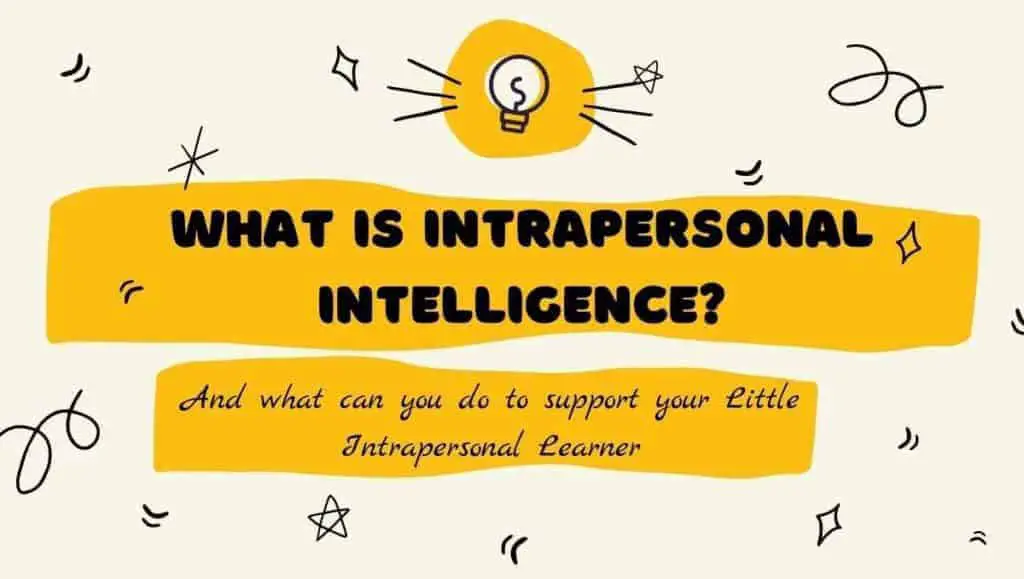We will continue our journey through the Multiple intelligences Theory that will give you a better understanding of how each intelligence works and how you can use it to help your child get to know the world and learn in a way that is comfortable and natural for them.
Today’s post is about a very special intelligence: the Intrapersonal. But before we discover together why this ability is important and how it can be used, let’s get some quick facts about the Multiple Intelligences Theory.
If you didn’t get the chance, make sure to read our article with information about what the Multiple Intelligences Theory is and how it can benefit your child.
In a nutshell, in 1983, developmental psychologist Howard Gardner identified eight different types of intelligences that each person has in different “doses”.
This means that, according to Gardner, each person has one or two intelligences/ abilities that are more developed. That person prefers learning using those types of intelligences above the others.
Having said this, it is important to know that throughout their lifetime human beings are able to successfully develop and train other types of abilities.
Greek philosopher Aristotle said, “Knowing yourself is the beginning of all wisdom”.
Having a good grasp of who we really are is a prized asset that can contribute to better self-control, appreciation of other people, decision-making, overall happiness and so much more. No wonder that people like Albert Einstein, Socrates, Mahatma Gandhi, Bill Gates all have this one thing in common: they all have a well developed Intrapersonal Intelligence.

What Is Intrapersonal Intelligence?
Intrapersonal Intelligence can be defined as the ability for self-reflection, knowing one’s strengths and weaknesses, being aware of one’s emotional state and motivations.
Intrapersonal Intelligence or being “self smart” allows you to get to know yourself better and how you function in different situations which in turn helps you to better adjust your study or work conditions to those that better suit you.
People with high Intrapersonal Intelligence generally have a very clear idea of what they want and the path they are going to take in order to achieve it.
What are some characteristics and Intrapersonal skills?
Individuals with high intrapersonal intelligence are self-aware. They know their desires, motivations and needs. They are very much in touch with their emotions and are able to promptly analyze their behaviour and how they react to different situations.
But does this mean a person with this type of intelligence is a tad narcissistic? The answer is: not at all. Narcissism is a personality disorder in which people constantly want to be the centre of attention and lack empathy for those around them. Whereas a person with intrapersonal intelligence is concerned with the world around and they get to know other people by knowing themselves first.
Other intrapersonal skills and characteristics include:
- They are good at controlling their impulses and negative reactions like anger, jealousy, frustration or annoyance.
- They generally have good intuition.
- They seek ways to develop and improve themselves.
- They have high self-confidence.
- They prefer working on their own opposed to group projects.
- Some people with this type of intelligence may be introverts but that doesn’t mean that they can’t communicate well when they have to.
- Because they possess high self-knowledge, they are aware of their weaknesses and strengths (although they do not boast about them).
- They like to analyze experiences they’ve been through especially negative ones which they try to correct or avoid in the future.
- Depending on the situation, they are quite adaptable, being able to understand other people’s point of view and easily changing their habits.
- They are perseverant, tenacious and efficient in their undertakings.
- They generally have a positive view on things.
- They are inclined to express their thoughts in creative ways.
- They have good leadership skills.
- They often need quiet time alone to reflect on their thoughts.
Although we all have certain degrees of intrapersonal intelligence, for some people self-analysis and introspection simply come easier. All of these characteristics can be identified in childhood which brings us to our next point.
Identifying Kids with Intrapersonal Intelligence
Generally, you will identify children who have strong intrapersonal intelligence by the fact they enjoy moments of independent play. They are also quite intuitive and willing to follow their instincts. You will also notice that “self-smart” kids like setting goals and taking clear steps to achieve them. They sometimes seem “lost in thought” when they tend to reflect on issues of interest to them.
Sometimes kids with intrapersonal intelligence may take longer to warm-up to other children or people so they are seen as being introverts.
Now that you have identified that one of your child’s intelligence is the intrapersonal what now?
I will draw attention to the wording of the above sentence, especially these: “one of your child’s intelligence”. According to H. Gardner, people possess 2 or even 3 dominant intelligences. So, in order to choose the best activities and help your child learn in a natural way for him/her, you will have to take into account the other dominant intelligence.
For example, if your intrapersonal learner also has a strong logical-mathematical intelligence, perhaps activities like coding, computer programming, solving Sudoku puzzles, creating and analyzing patterns might be activities that successfully combine both types of intelligence. Or if the other intelligence is musical, they might enjoy writing songs, playing instruments like the piano or violin. Generally, these activities involve solitary work.
Discover The Best Activities for Kids with Intrapersonal Intelligence.
How can parents and educators support Intrapersonal learners?
There are a few things that you can do if you have an Intrapersonal Learner at home or in the classroom:
- You need to allow them the time they need to analyze what they have learnt.
- Provide them with the means of laying their thoughts on paper and encourage them to do so (give them paper, notebooks, access to a computer, writing tools etc).
- Allow them to express their feelings and opinions on various matters.
- Help them understand how the things they learn are related to their lives.
- Allow your intrapersonal learner to make certain choices when it comes to what they want to learn (of course, within the boundaries set by you).
- Help them set goals and let them decide on the course of action to achieve those goals.
Before we go
Some people are born with higher levels of intrapersonal intelligence but that doesn’t mean that a person outside this area can’t develop it throughout their life.
In fact, developing intrapersonal intelligence can have a positive impact on one’s academic, professional and personal life. Getting to know oneself and being in tune with one’s feelings and emotions will allow a person to be more self-aware, make better decisions, communicate better with people around and have self-confidence.
Getting to know ourselves also means that we are less vulnerable to negativity and cope better with challenges.
Helping your child develop the intrapersonal intelligence will allow them to focus better and solve tasks which require them to work by themselves.
Ultimately, we shouldn’t forget to take time to discover our children’s abilities and gifts and help them achieve their goals in a way that is natural and comfortable for them.
“We should spend less time ranking children and more time helping them to identify their natural competencies and gifts and cultivate these. There are hundreds and hundreds of ways to succeed and many, many different abilities that will help you get there.”(Gardner, 1986)
If you found this post informative, please share it with your friends 🙂
Also Read:
Interpersonal Intelligence Activities for Kids
Insanely Fun Activities for the Verbal-Linguistic Learner
The Best Activities for the Logical-Mathematical Intelligence
Activities for Auditory Learners
Activities for Kids with Intrapersonal Intelligence
The Best Activities for the Bodily-Kinesthetic Learners
The best Activities for the Visual-Spatial Learner
11 Existential Intelligence Activities for Kids

Mom of two wonderful children, dedicated teacher and book lover.




This is a very informative post. I’ve never heard of those different types of intelligences. Thanks for sharing.
As someone studying educational psychology I so loved this post
Great post! It’s a good idea to allow our kids to reflect and maybe even help them do that. As a busy mum, it’s often not as easy to do. Thanks for the reminder!